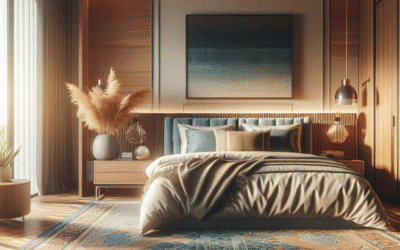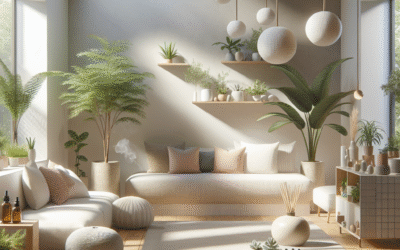
Opening Section
Living in a small space can often feel like a juggling act; you want to create a cozy, inviting environment without feeling cluttered or cramped. Small space solutions using soft furnishings can make a world of difference. Soft furnishings not only add warmth and comfort but also serve functional purposes that can help maximize your limited square footage.
Did you know that well-placed textiles can visually expand your space? From strategically chosen curtains to multi-functional throw pillows, the right soft furnishings can create the illusion of roominess while providing a personal touch. In this article, you’ll discover multiple ways to transform your small space into a sanctuary that reflects your unique style and meets your needs.
What You Will Learn
- How to choose the right soft furnishings for your space
- Practical tips for maximizing functionality
- Creative ways to use colors and patterns
- Proven strategies for decluttering and organizing
- Inspiration and ideas for different room types
By the end of this comprehensive guide, you’ll be equipped with actionable insights to redefine your small space using soft furnishings.
H2: Understanding Soft Furnishings
H3: What Are Soft Furnishings?
Soft furnishings refer to movable items found in a space, including cushions, curtains, rugs, and throws. These elements contribute not just to the aesthetics but also to the comfort and overall functionality of your home.
H3: Why Soft Furnishings Matter in Small Spaces
In smaller environments, every choice counts. Soft furnishings can serve multiple purposes:
- Decoration: Add color, texture, and personality.
- Functionality: Provide extra seating or sleeping spaces.
- Defining Zones: Create distinct areas without walls.
H2: Choosing the Right Soft Furnishings
H3: Fabrics and Materials
When selecting soft furnishings for tight spaces, consider lightweight fabrics such as cotton or linen. Durable yet breathable options are perfect for maximizing comfort while allowing for easy maintenance.
H3: Color Selection
Opt for light colors to make spaces feel larger. Soft pastels or neutral tones reflect light and create an airy atmosphere. You can also use splashes of bolder colors through cushions or throws to add character.
H3: Patterns and Textures
Patterns can be a double-edged sword in small quarters. While busy designs can overwhelm, subtle patterns can add depth without feeling claustrophobic. Texture, on the other hand, can create visual interest and enhance comfort.
H2: Practical Tips for Small Spaces
H3: Multi-Functional Soft Furnishings
Cube Ottomans vs. Traditional Chairs
Cube ottomans can serve as footrests, extra seating, or even storage. Evaluate your existing furniture and consider alternatives that can perform multiple functions.
H3: Layering Textiles
Combine different types of textures—such as a plush rug under a lightweight throw blanket—to add depth to your design without overcrowding the space.
H3: Curtains and Drapes
Opt for floor-length curtains to draw the eye upward, creating an illusion of taller ceilings. Moreover, sheer drapes allow natural light to permeate the space while providing a level of privacy.
H2: Decluttering and Organization
H3: Baskets and Storage Containers
Incorporating soft baskets as décor can provide a stylish yet practical storage solution, ideal for keeping throws and books organized.
H3: The Power of Minimalism
Less is often more. Aim to curate your soft furnishings to include only what you love and use. This not only creates a clean aesthetic but also simplifies your space.
H3: Seasonal Rotation
Switch out soft furnishings seasonally to keep your décor fresh. This can include swapping heavy winter throws for lighter summer options.
H2: Inspiration for Different Rooms
H3: Living Room
In a small living room, consider a sectional with soft, removable upholstery that can be easily cleaned. Accent cushions in varying shapes and sizes can create a cozy atmosphere without overwhelming the visual space.
H3: Bedroom
Layering bed linens with various textures—even a soft, chunky knit throw over a sleek quilt—can enhance comfort while also adding visual interest.
H3: Small Home Office
Utilize multi-functional poufs as both seating and storage in a tiny home office. Complement them with a comfortable cushion for your chair, enhancing both ergonomics and aesthetic appeal.
H2: Case Studies and Real-World Applications
H3: Transforming a Studio Apartment
Explore the story of Sarah, who turned her 300 square-foot studio into a chic environment using modular furniture and smartly placed textiles. Sarah’s approach highlights the significance of soft furnishings in optimizing space efficiency.
H3: Maximizing Vertical Bed Space
Meet Jason, who created an impressive bedroom in his tiny house utilizing under-bed storage and layered bedding—demonstrating how soft furnishings can provide practical solutions.
H2: Tools and Resources
H3: Helpful Apps
- Houzz: Great for visual inspiration
- Pinterest: Fantastic for collecting design ideas and trends
H3: Brands to Consider
Brands like IKEA and West Elm offer versatile soft furnishings that cater to small living spaces while maintaining style.
FAQ Section
What are soft furnishings?
Soft furnishings include movable items such as curtains, cushions, and rugs that enhance comfort and aesthetics in a space.
How can I use soft furnishings to maximize my small space?
Opt for multi-functional items, like storage ottomans, and choose lighter fabrics and colors to create an illusion of space.
Can soft furnishings make a space feel bigger?
Yes, using light colors and avoiding bulky patterns can make a room feel more open and airy.
What are the best fabrics for small spaces?
Cotton, linen, and other lightweight fabrics are ideal for small areas, as they are easy to maintain and provide comfort.
How do I choose the right color scheme for soft furnishings?
Select soft, light colors for a spacious feel; add bolder tones through accents like cushions or throws.
Conclusion & Next Steps
Soft furnishings are the unsung heroes of small space living. By thoughtfully selecting and applying these elements, you can transform any cramped living area into a stylish and functional oasis. Remember, it’s not just about what you include, but how you layer and organize them to create a harmonious environment.
Now that you’re armed with invaluable insights, it’s time to take action. Begin by evaluating your current space and identifying areas where soft furnishings can make a positive impact. Don’t forget to check out our related articles on maximizing vertical space and decorating with minimalism for further inspiration!
Content Disclaimer
Information provided for educational purposes only and should not be considered professional advice. Always consult relevant experts for personalized guidance.
Categories
- Accent Walls & Ceilings (84)
- Art Curation & Gallery (83)
- Bedding Style Trends (89)
- Bedroom Makeover (96)
- Bohemian & Eclectic Styles (80)
- DIY & Budget-Friendly Decor (78)
- Eco-Friendly Design (83)
- Furniture Care (87)
- Home Decor & Design Ideas (181)
- Home Wellness Spaces (103)
- Integrated Outdoor Living (91)
- Japandi Style (84)
- Kids and Nursery Decor (73)
- Living Room Decor (99)
- Mix & Match Techniques (95)
- Modern & Contemporary Design (88)
- Rug Sizing & Placement (89)
- Scandinavian Design Inspiration (51)
- Seasonal Home Decor (100)
- Small Space Solutions (93)
- Wall Art & Painting Tips (94)
Recent Comments
Archives
Product Gallery
-
Majestic African Wildlife Canvas Art for Stylish Home Decor
Rated 5.00 out of 5 -
Cozy Irregular Green Plush Rug for Nordic Living Spaces
Rated 5.00 out of 5$44.23 – $278.89Price range: $44.23 through $278.89 -
Scandinavian Geometric Area Rugs for Stylish Home Décor
Rated 5.00 out of 5$33.15 – $502.10Price range: $33.15 through $502.10













